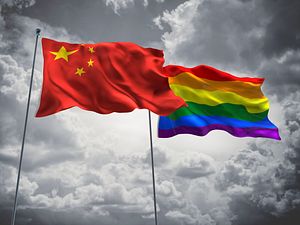It all began last January when the Furong Bureau of Civil Affairs in Changsha, the capital of Hunan province, rejected a marriage application submitted by two men, Sun Wenlin and Hu Mingliang. The applicants then decided to file a suit, arguing that while the law defines marriage as a union between a husband and a wife, the term yi fu yi qi, literally “one husband one wife,” refers to social identities rather than genders. Sun and Hu lost their case on April 13, but that the Furong District People’s Court ever consented to hear it in the first place is remarkable.
“It is a monument on the way to victory,” said John Shen, program manager at the Beijing LGBT Center. Similarly, ABC News ran the headline, “Despite Court Ruling, China Gay Rights Movement Makes Gains,” and reports by other news agencies were comparably rosy, reflecting the mood of the plaintiffs themselves and, it seems, the courtroom atmosphere.
“We gave away our ‘wedding’ candies after the hearing,” said Sun, “and even the opposing lawyer took a candy with a smile.”
There certainly is cause for celebration. In a country where the government routinely “disappears” gay rights activists, Sun and Hu have belled the cat and walked away with nary a scratch. That’s actually a big deal, too, when you consider that China established a nationwide case filing system in 2000. In “Justice Without Judges: The Case Filing Division in the People’s Republic of China,” Nanping Liu and Michelle Liu write that this system “gives judges immense power to exercise wide discretion in accepting or rejecting cases without affording any access or accountability to the public.” As they later explain, “A cynical view is that the case filing division is a gatekeeper that the Chinese leadership employs to keep things that embarrass it out of its courts.”
Still, for their part, the Chinese government and state media have predictably given the story a wide berth. But reflecting on China’s progress over the past few decades, it’s easy to see how this case can be read as a happy ending. As I noted when writing about this issue in January, homosexual sex was legalized in 1997, declassified as a mental illness in 2001, publicly celebrated in the first Shanghai Pride in 2009 — and now it’s had its day in court.
But we can also draw a very different arc, one that details Beijing’s increasingly hostile belief that the gay community should find their silence. For instance, the government banned Fan Popo’s documentary about mothers who love their gay children last December, outlawed depictions of gay people on television last month, and now, with this case, has officially rejected marital equality for gays.
Yes, the opposing lawyer accepted a candy with a smile, but what was the judge thinking? More importantly, what is Beijing’s view? The oppression of gay rights activists and the censorship of depictions of gay people in media don’t, by themselves, suggest that the government is opposed to homosexuality. It’s more likely that Beijing is simply, as ever, opposed to any ripples in the water, for any reason. Yet it is possible to glimpse what the judge, and the Party, are thinking.
The Furong District Court declared, in a statement published on its website, “The regulations clearly define marriage as referring to men and women,” from which we might conclude that this is merely a technical matter, and that a change in the law will result in a different verdict. As argued by an op-ed in the Legal Daily in January, “homosexuals can appeal at the legislative level to amend existing legislation.” And, the piece goes on to say, because the plaintiffs didn’t do that, this was more spectacle than practical, and their case was “a waste of judicial resources.”
Is raising awareness practical? Sure, but not if the government is wielding thick point Sharpies. After all, the television ban lists homosexuality in the same sentence as incest and sexual assault, which gives you some idea what Beijing thinks of the LGBTQ community.
I still believe, as I wrote in January, that when it comes to consciousness raising, this case is “already a victory,” but gay rights in China is about more than awareness. Perhaps the government already knows where this is headed. Perhaps that’s why it allowed this case, and perhaps its media bans are just the Party pumping the brakes to prevent the kind of momentum that leads into revolutions. Although really, the best way for Beijing to make this problem go away is by giving gay rights activists what they want.

































